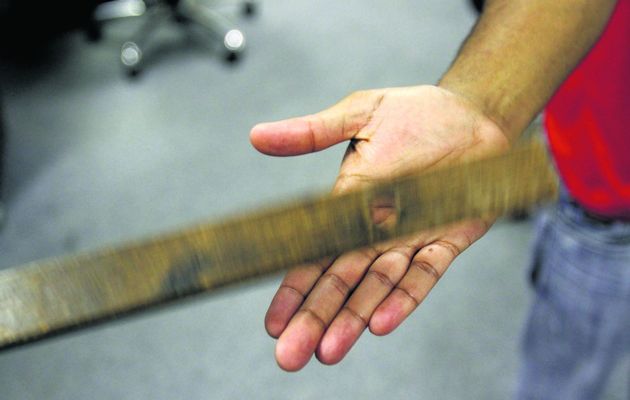Although South Africa banned corporal punishment in September 1997, 17 years later, this form of punishment is still being used by some educators. This week, it emerged that a learner at Ndindini Junior Secondary School in Lusikisiki in Eastern Cape was beaten so brutally, he lost his sight. The grade 4 pupil Sive Joyi is recovering in the Nelson Mandela Academic hospital and will undergo an operation to repair the damage to his eyes. The boy lost his sight after he was allegedly beaten with a stick on the head by his teacher.
That isn’t the first incident of the year that has been reported. A Grade 8 learner at Edenville High School in the Northern Free State says a teacher beat her and gave her a bad bruise below her right eye in February.
The South African Council of Educators (SACE) has called on educators to refrain from applying corporal punishment on learners.
According to child rights activist Carol Bower, parents should lay charges against teachers who use corporal punishment as a means of discipline.
“This story of this learner is shocking but it isn’t unusual. The teacher that hit this child should have charges laid against them. A criminal process should be followed. What has happened here is illegal. Criminal charges should be laid on the child’s behalf and a criminal matter should be embarked upon.”
Bower said there are often very serious physical consequences with physical punishment, and far worse, has major psychological effects.
“Not hitting children in school is not just about not hurting, them but it is dangerous. We know that children at school where corporal punishment is used routinely do worse on IQ tests and do worse on tests which we call executive functioning, which is higher level functioning… like the ability to delay gratification, the ability to think ahead, the ability to be self-disciplined etc. They lose those abilities at a cognitive, at a brain level, when they are repeatedly punished corporally,” Bower explained.
In an increasingly violent society, corporal punishment sets a dangerous precedent, said Bower.
“Corporal punishment teaches the entirely wrong lesson about how to respond when you don’t like something. It teaches children that it’s ok to hurt other people, that violence is an acceptable response to disagreements. This is not a good lesson to teach to children in a country with a huge problem of violence already.”
Do teachers have the right to discipline?
Educators are usually one of the most influential people in a child’s life as they are responsible for most of the aspects of a child’s development, including discipline. However, while children need discipline, it must be noted that discipline is a totally different concept from punishment.
“Discipline means to teach, to guide and to help learn whereas punishment means to hurt, to harm and to damage. They are completely different, of course teachers need to have discipline in their classrooms, but there are just other better, less harmful and more productive ways of achieving it than hitting a child till his eye falls out literally,” Bower said.
Perhaps the problem comes in when parents and teachers have difficulty knowing how to discipline children.
“There is a lot of help out there. In Cape Town we have the Parent Centre, there is also Families South Africa (FAMSA) as well as numerous other initiatives that teach better ways to discipline children. Parenting and teaching are difficult jobs. It is hard to raise a child, but it is also the most amazing and most wonderful thing to do,” Bower emphasised. VOC (Najma Bibi Noor Mahomed)






 WhatsApp us
WhatsApp us 

